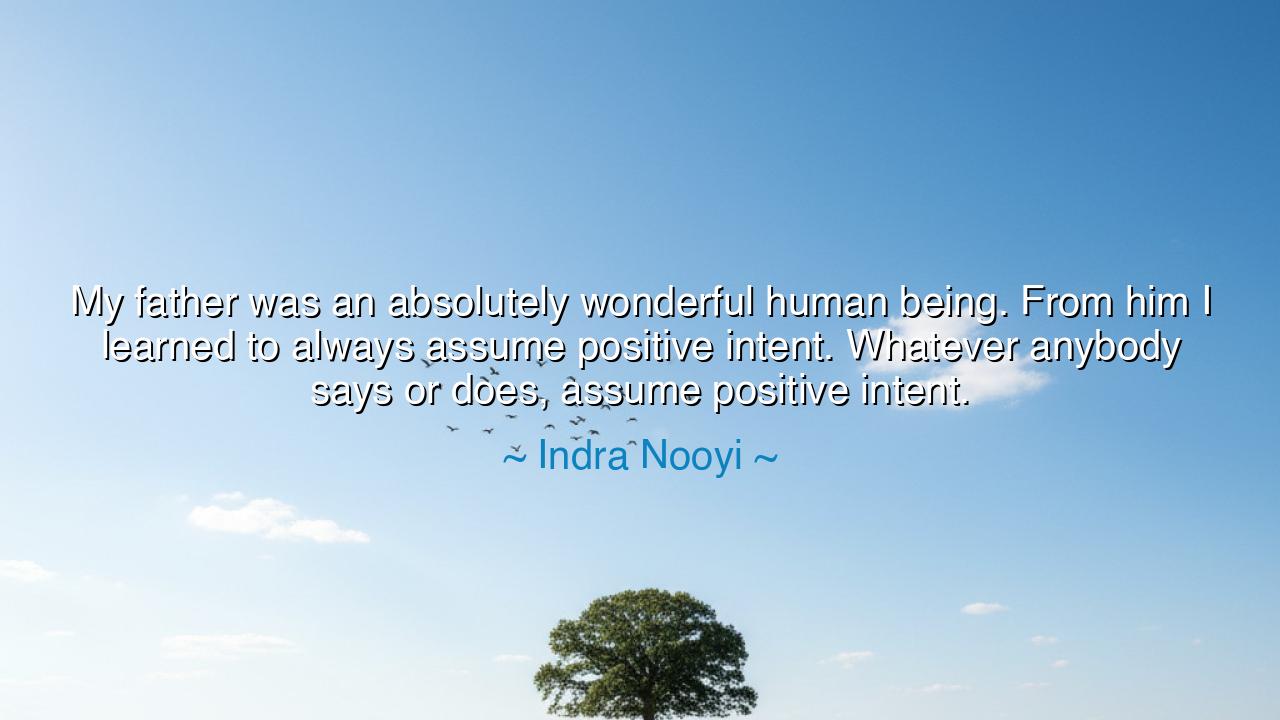
My father was an absolutely wonderful human being. From him I
My father was an absolutely wonderful human being. From him I learned to always assume positive intent. Whatever anybody says or does, assume positive intent.






The words of Indra Nooyi—“My father was an absolutely wonderful human being. From him I learned to always assume positive intent. Whatever anybody says or does, assume positive intent.”—shine like a torch passed from one generation to the next. They carry not only the wisdom of a leader but the tenderness of a daughter honoring her father’s greatest gift: a way of seeing the world that transforms conflict into understanding and suspicion into trust. To assume positive intent is no small teaching; it is a discipline of the heart, requiring patience, humility, and courage.
From the earliest days of human history, mistrust has been both a shield and a prison. Suspicion protects us from harm, yet when carried too far, it poisons every word and gesture with doubt. What Nooyi’s father taught her was a higher path: to meet others not first with suspicion, but with openness, believing that beneath clumsy words or imperfect deeds, there often lies good will. Such a stance does not make one naïve—it makes one strong enough to choose faith over fear, and understanding over hostility.
History gives us great examples of this principle in action. Consider Abraham Lincoln, who during the American Civil War was often criticized by his cabinet for being too lenient toward his rivals. Yet Lincoln believed that assuming positive intent, even among adversaries, allowed him to build bridges where others saw only walls. His magnanimity enabled him to form alliances and to heal divisions, preparing the ground for reconciliation after war. Had he chosen suspicion at every turn, his leadership would have fractured into bitterness and mistrust.
To assume positive intent is also to recognize the limits of our perception. Words may be spoken poorly, actions may be misunderstood, but if we pause and interpret them through the lens of goodwill, we may find peace where conflict seemed certain. This practice guards us from the quick anger that destroys relationships. It is a shield against rash judgment, and a doorway into dialogue. The ancients themselves taught this in another form: “Judge not by appearances, but by the heart.”
Yet this teaching requires strength, for the world often trains us to do the opposite. Cynicism is easy; it costs nothing but corrodes everything. Trust, however, is costly, for it demands vulnerability. Nooyi’s father, in teaching her to choose trust, gave her a resource more valuable than wealth or power. It allowed her to rise in leadership without being consumed by suspicion, to draw out the best in others by first believing the best of them. In this way, assuming positive intent is not weakness, but a profound strategy for leadership and for life.
The lesson for us is clear: when faced with the words or actions of others, choose first to believe in their goodness. If they err, guide them; if they falter, strengthen them; if they mean harm, the truth will reveal itself soon enough. But by beginning with trust, you open the door for cooperation, respect, and peace. In friendships, in families, in workplaces, this principle can transform relationships and unleash hidden potential.
So, dear listener, take these words into your heart. Practice the discipline of assuming positive intent. When tempted to judge harshly, pause. When hurt by another’s words, ask if they perhaps meant kindness. When confronted with strife, remember that suspicion breeds division, but trust invites healing. For as Indra Nooyi has shown, and as her father once lived, to assume positive intent is to walk the higher path—a path of grace, strength, and enduring peace.






HCnguyen hoang chi
This quote resonates with me personally because it suggests a way to navigate misunderstandings with generosity rather than suspicion. Yet I can’t help but question the limits: are there times when assuming positive intent could backfire? For example, in situations of repeated dishonesty or abuse, how should one reconcile this principle with self-protection? I’d like to explore practical ways to cultivate this mindset while still maintaining discernment and healthy boundaries.
TTthuy Nguyen thi thuy
I feel both admiration and curiosity reading this. Assuming positive intent seems like a powerful tool for emotional intelligence and conflict resolution, but I wonder how it interacts with cultures or environments where trust is limited. Does this approach work universally, or is it more effective in certain contexts? Also, is there a psychological framework or evidence that supports the idea that assuming positive intent leads to better outcomes in relationships and leadership?
VTLy Vu thi
This makes me reflect on the influence parents have on shaping our perspectives and interpersonal skills. How much does assuming positive intent actually impact professional success or personal growth? Could adopting this mindset improve collaboration and empathy, or does it risk overlooking patterns of bad behavior? I’m curious if there are strategies to practice this approach without ignoring red flags or compromising one’s boundaries.
MBMiu Bach
I find the idea of assuming positive intent both inspiring and challenging. On one hand, it could reduce misunderstandings and conflicts in relationships and workplaces. On the other, is it realistic in every situation? What happens when someone’s actions are clearly harmful or manipulative? I wonder how to balance this principle with healthy skepticism, and whether assuming positive intent might sometimes make people vulnerable to being taken advantage of.